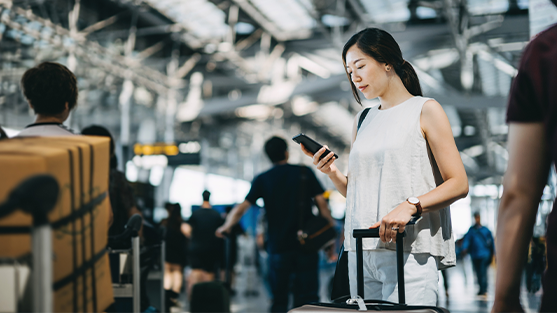
How ready are Canadian businesses for emerging travel risks?
New study sheds light on opportunities for improvement
As global travel disruptions rise due to natural disasters and political unrest, Canadian businesses face a pressing question: Are they truly prepared for travel emergencies?
According to Corporate Traveller’s booking insights, business travel in Canada is projected to increase by 11% in 2024. But a recent study conducted with YouGov highlights a critical gap—many companies still lack comprehensive travel crisis protocols.
This report dives into the data, providing key insights into business travel preparedness, generational disparities, and the hidden costs of travel-induced stress on employees.

The state of preparedness
66% of Canadian business travellers say they have protocols for emergency travel disruptions like extreme weather, but:
- 21% have no specific protocols
- 12% are uncertain about their emergency procedures
While many companies have established protocols, this is a great opportunity for all to align their business travel strategies with the best practices. Comprehensive, adaptable plans are crucial to navigating the evolving global environment.
-Chris Lynes | Managing Director for Flight Centre Travel Group Canada
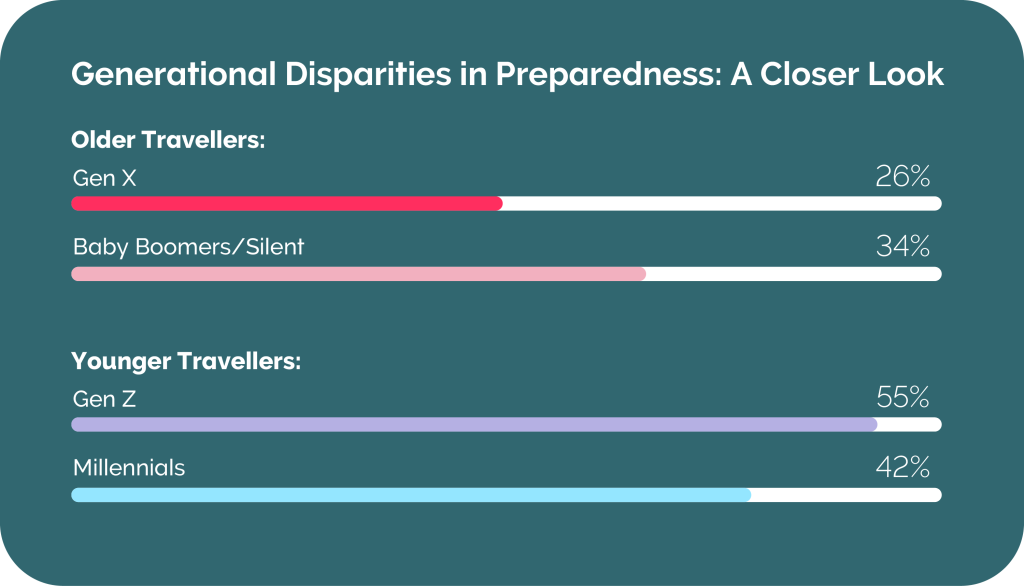
Generational disparities in preparedness: A closer look
- Older travellers:
- Gen X: 26%
- Baby Boomers/Silent: 34%
- Younger travellers:
- Gen Z: 55%
- Millennials: 42%
Younger employees' willingness to travel during emergencies underscores the need for specialized training and communication strategies to make sure they’re well-informed and prepared.
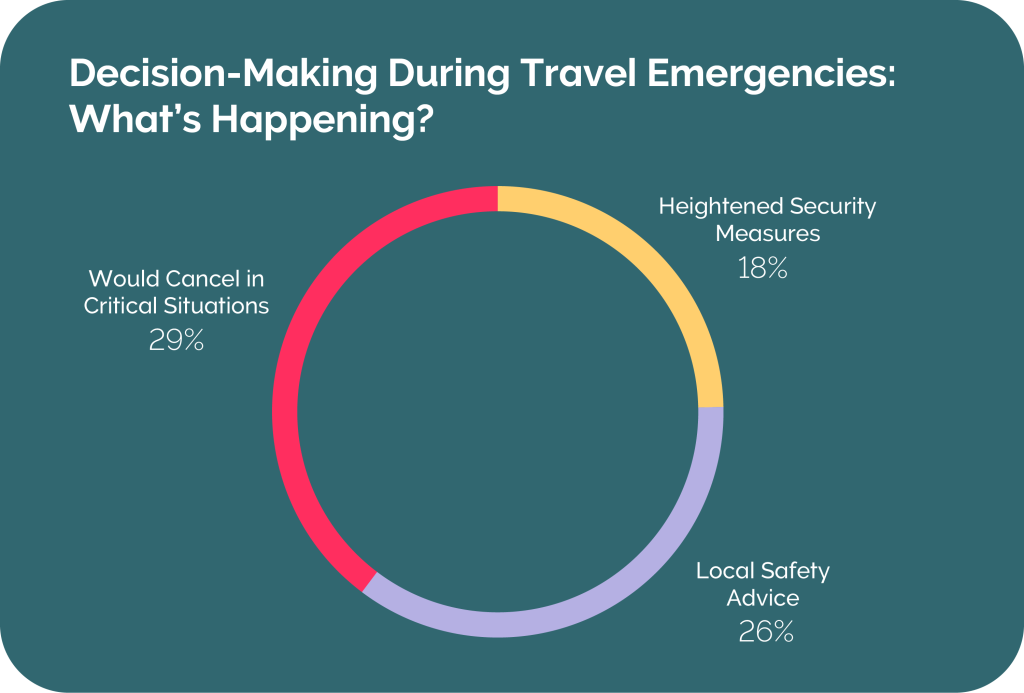
Decision-making during travel emergencies: What’s happening?
Nearly 40% of business travellers reveal their organization’s travel protocol is to continue their trips during emergency disruptions like severe weather:
- 18% supported by heightened security measures
- 26% relying on local safety advice
- 29% would cancel trips in critical situations, especially infrequent travellers
Interestingly, frequent travellers (3-4 times a year: 45%, 5+ times a year: 49%) are more inclined to soldier on compared to infrequent travellers (1-2 times a year: 19%).
Conversely, 29% of respondents state their organizations would cancel trips during critical situations, with infrequent travellers more likely to favour this cautious approach.
73% of respondents underscore the importance of having round-the-clock support from professional travel consultants during emergencies.
These figures prompt businesses to refine their travel support structures and adopt flexible, context-specific protocols that can accommodate varying levels of risk and individual circumstances. In the last six months, we have successfully evacuated thousands of professionals, showing the significant benefits of these measures by saving businesses nearly $20 million.
-Chris Lynes | Managing Director for Flight Centre Travel Group Canada
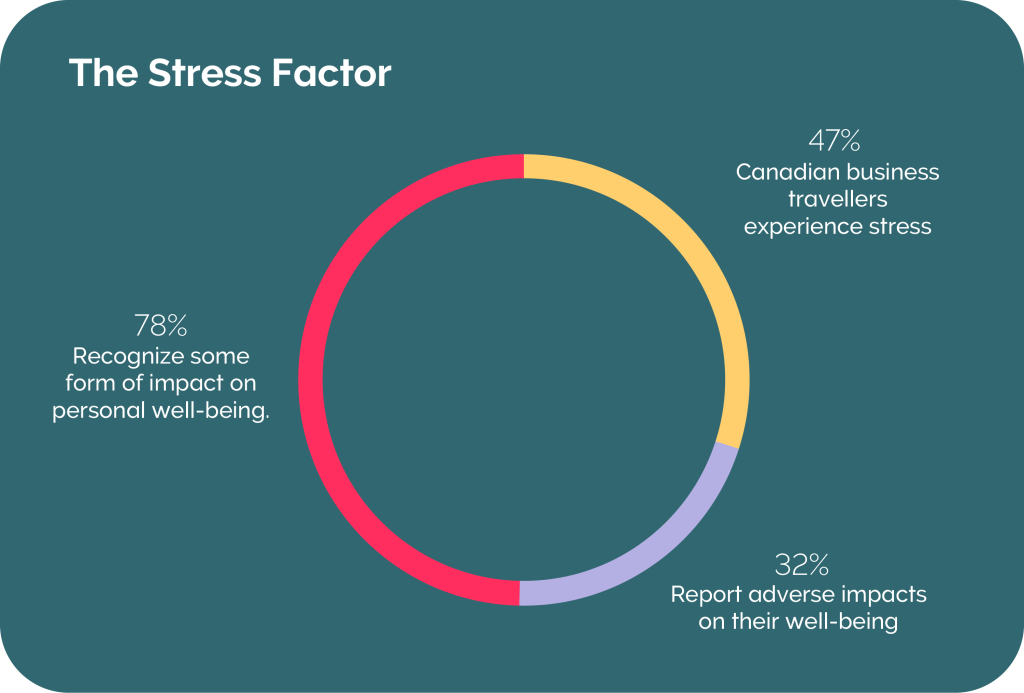
Stress and well-being: The hidden costs of business travel
Nearly half of Canadian business travellers surveyed face stress challenges and could benefit from enhanced support and well-being initiatives. With 4.1 million Canadians already experiencing work-related stress (Statistics Canada), and business travel in Canada projected to surge by nearly 15% in 2024, businesses play a key role in promoting balanced work-life experiences. Implementing adaptive travel policies that integrate business with leisure can make a substantial difference.
The stress factor
- 47% of Canadian business travellers experience stress
- 32% report adverse impacts on their well-being
- 78% recognize some form of impact on personal well-being
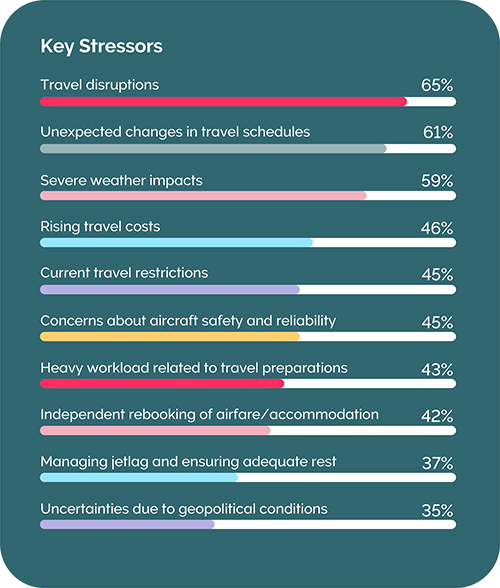
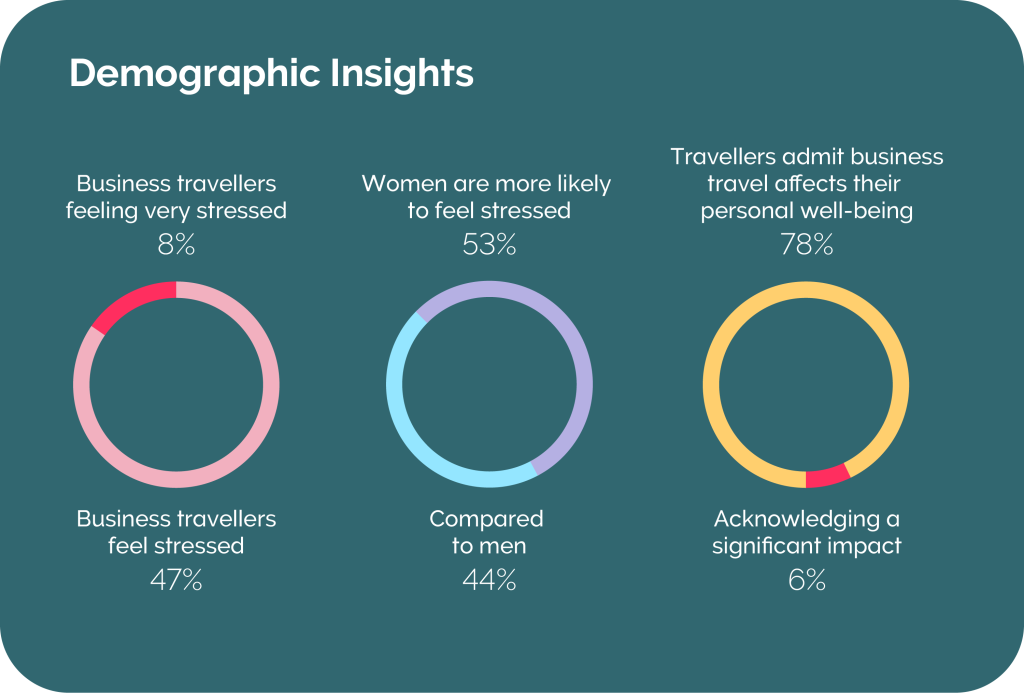
Demographic insights
Younger travellers are more likely than older travellers to cite balancing a heavy workload with travel preparations (Gen Z: 52% and Millennials: 47% compared to Gen X: 36% and Baby Boomer/Silent: 32%), while Gen X is more likely than Gen Z to cite travel disruptions (71% compared to 56%).
- 47% of business travellers feel stressed, with 8% feeling very stressed
- 53% of women are more likely to feel stressed than men (44%)
- 78% of travellers admit business travel affects their personal well-being, with 6% acknowledging a significant impact
Flexible business trip policies, blending work with leisure, foster a balanced work-life environment and result in happier, healthier employees. We have found that such policies are especially beneficial for frequent travellers and younger employees, contributing to reduced turnover rates.
-Chris Lynes | Managing Director for Flight Centre Travel Group Canada
Conclusion
Corporate Traveller’s study highlights the progress and future opportunities for Canadian businesses in travel preparedness. By leveraging these insights, companies can:
- Raise risk awareness
- Prioritize health and well-being
- Enhance business travel support
Addressing these areas will not only improve emergency preparedness but also contribute to a healthier, more productive workforce.
Methodology:
Figures from the study conducted by YouGov Plc reached a total sample size of 1,049 adults from Canada who are likely to travel for business in the next 12 months. Fieldwork was undertaken between July 3–11, 2024. The survey was carried out online and commissioned by Corporate Traveller. The figures have been weighted and are representative of all Canadian business travellers (aged 18 and older).
Unless stated otherwise, all other data is based on Corporate Traveller insights.
Media Contact:
For hi-res images, b-roll or media enquiries, please contact: media@corporatetraveller.ca